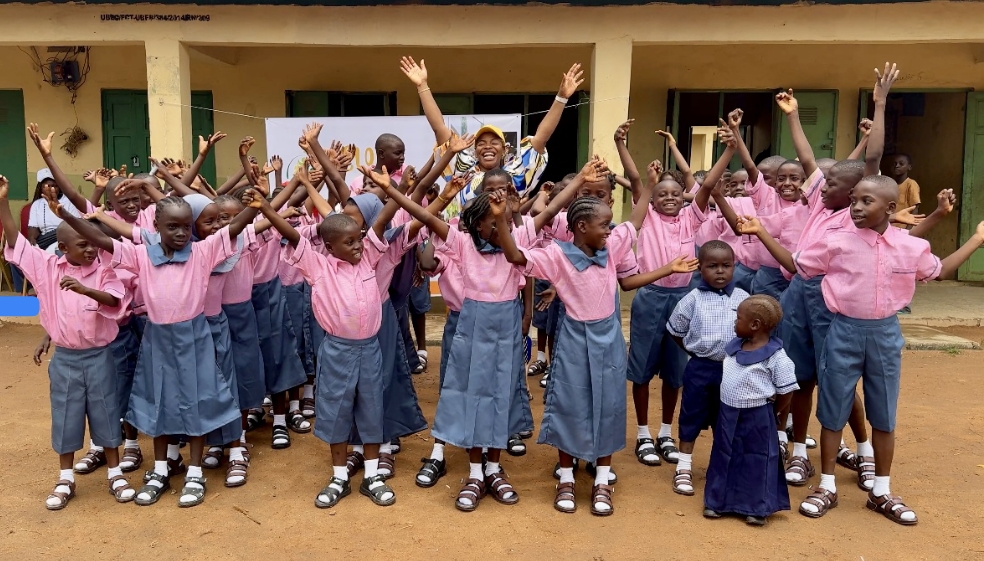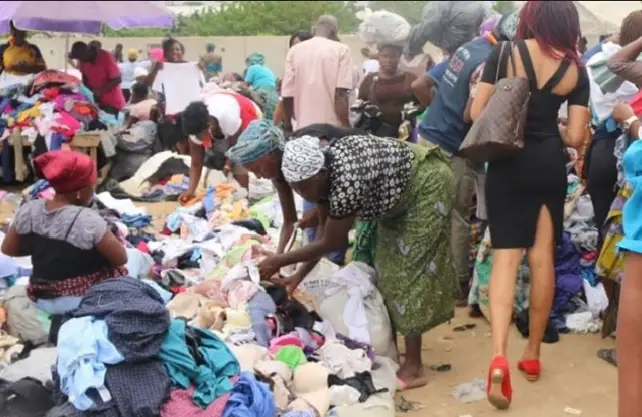By Veronica Dariya
Some sellers of second-hand clothing, popularly called thrift or “okrika”, have described the high demand and trend of the items as essential for Nigerians, amid rising cost of living.
The vendors gave their opinion of the trend in an interview with the News Agency of Nigeria (NAN) on Sunday in Abuja.
They said that with the rising cost of living, second-hand clothing was now widely embraced by Nigerians because of its affordability and budget-friendliness.
For the sellers, it is a thriving and profitable business.
NAN reports that both thrift and okrika are generally referred to as fairly used clothes, bags, shoes, imported from especially the UK and the USA, but have different market presentation, pricing and target customers.
Mrs Joy Timothy, one of the commodity sellers in Bwari, told NAN that most of her customers were students and workers, who could no longer afford new brands.
She noted that although both thrift and Okrika are crucial sources of affordable clothing, thrift items are mostly newer and usually handpicked, sorted, and sometimes styled for resale.
Timothy said that thrift items are sold faster in online spaces because of its style, originality, and convenience.
“Thrift bale is almost new; you can find clothes by famous designers that may have been taken off store shelves abroad, probably due to a minor defect or sewing mistake; it might not necessarily have been used before.
”Some even come with their tags. We sort them and hang them for resale online on social media platforms like Instagram and WhatsApp, or in boutique for those who have larger supplies..
“We use online marketing because it attracts students, young professionals, and fashion-conscious buyers who prefer unique and trendy items that are uncommon,” Timothy said.
Timothy added that prices of thrift are usually higher than regular second-hand items but are still cheaper than brand-new clothes in some boutiques or stores.
On the other hand, she said Okrika are sold in open markets, roadside stalls, or through bale sales at much cheaper prices and was more accessible and affordable, especially to middle-income earners.
Similarly, Madam Peace Ugo, an okrika trader in Bwari market, said that demand for second hand clothing had increased among Nigerians because of its affordability, stylish and budget-friendly options.
She also noted that it provided a significant hustle opportunity and a source of income and livelihood for its traders, including online vendors, whom she noted, were mostly youths.
Ugo said that although thrift and okrika vendors competed for patronage, both have their target customers and none was a threat to the other in the business.
According to her, okirika sold faster in terms of volume and daily patronage, probably because of physical market location, especially when new bales opened on specific days.
” Thrift on the other hand, has a higher profit margin per piece than okrika because those who know the value of what they were getting would pay as much to get just an item for twice the price of an okrika item; especially if they compared the price to a brand new one,” she said.
She added that while okrika items attracted bulk buyers like mothers, who buy for their children and wards, students and sometimes, traders who buy for resale at other stalls.
On preference, Miss Regina Oche, a student, told NAN that although selecting good items from okrika bale was a bit hectic and stressful, she preferred to sit and get as much as she wanted at a cheaper price, compared to buying one or two thrift clothings online.
” Sometimes I stand for more than 30 minutes , picking and selecting. I can get over ten good items for N1000 per piece or even less, but in a thrift store, only one item is like N3, 500 or more.
” What I observed is, you can still get upgraded goods like that of the thrift from an okrika bale if you can patiently select and sometimes, even the thrift vendors get it from there too.”
Another buyer, Mrs Chinwe Ofor, said that with the inflation and rising cost of living, many people turned to okrika items, not only for the cost but because it was more durable.
“A lot of parents, especially, find it more practical to get clothes for their children who quickly outgrow clothes, from selected bales. Including shoes, school and lunch bags and at very cost effective prices too.
” I also like buying from the local sellers because I believe that it will help boosts their business and empower them to fend for their families too.”
However, Mrs Glory Etim, another buyer, said that she preferred thrift buying because it was stress free, affordable and easier for a corporate worker like herself who had little or no time to go shopping in the market.
She also said that her preference was also because thrift clothes were “far cheaper than new ones” and one could get a branded or high-quality pieces at a fraction of the price.
“They usually have this unique or vintage appeal styles that are rare and not available in regular stores.
“Also, if you are a fashion lover, you can create a personal style that stands out, from a thrift collection instead of wearing mass-produced items,” Etim said.
She added that second hand clothings had helped reduce demand for expensive brands and has promoted trendy, fashionable recycling among Nigerian youths, especially students and workers.(NAN) (www.nannews.ng)
Edited by Dorcas Jonah/Ismail Abdulaziz






